Post-Play Palaver is an occasional series of conversations between DCMetroTheaterArts writers who saw the same production—in this case the same two productions, Chekhov’s Three Sisters and Aaron Posner’s No Sisters, now both playing at Studio Theatre—and just had to keep talking about what they saw.
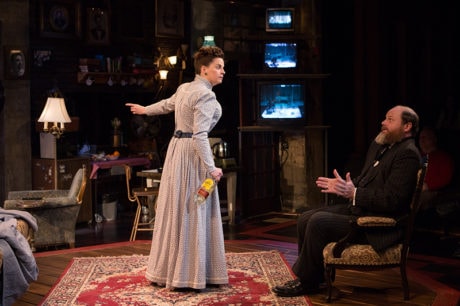
Senior Reviewer and Columnist Andrew Walker White in his review of Three Sisters praised “[Director] Jackson Gay’s brilliant production,” and wrote,
Gay’s touch is deft enough that even seasoned Chekhov fans will find new revelations from a drama we think we know by heart; the relationships under her watch are more intense and more visible than I remember from productions past—and believe me, I’ve seen me a few.
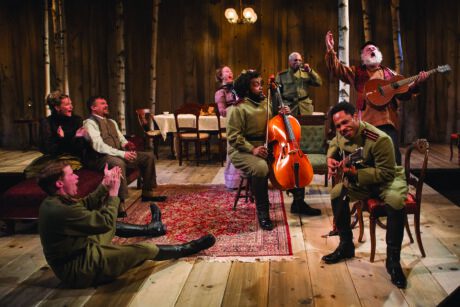
Senior Reviewer and Columnist John Stoltenberg in his review of No Sisters, raved,
Following on Stupid Fucking Bird (Posner’s hilarious rejuvenation of The Seagull) and Life Sucks (his delightful ditto of Uncle Vanya), No Sisters again out-Chekhovs Chekhov. It is a genius comedy of the soul that lets loose what Chekhov kept a lid on.
Here Andrew and John compare notes on the half of the double bill they saw but didn’t review.
John: I’m going to jump right in and ask the awkward question: Between the two productions, Three Sisters and No Sisters, which was more successful and why? And I’ll start the ball rolling by saying something that might sound outrageous: I thought the Posner-written-and-directed production in the second-floor Milton was far and away more faithful to Chekhov than the Gay-directed production of Chekhov’s text in the main-floor Mead. I thought Posner better captured what I think of as Chekhov’s compassionate sense of humor—the distinctive way Chekhov can make a character’s soulfully serious speech strike us as funny, completely without condescension. Many of the monologues Posner has given his characters are pricelessly Chekovian in that sense. And I kept missing that quality downstairs during Three Sisters. I sensed that much of the humor in the playing of Three Sisters was cheap laughter, easy yuks, not incisively nuanced as it was upstairs.
Andrew: I agree that the sense of humor was lacking in Three Sisters, but I give the director props for revealing things in that production I had never seen before.
Chekhov struggles to be taken seriously as a comic artist, and it’s possible that we’re stuck with American directors who take Stanislavsky entirely too seriously (face it, folks, he was a dilettante: he was an industrialist named Alexeyev who used a fake-Polish name for his stage work, OK?).
The scene (I think it’s Act 3) where Vershinin and Masha are desperate to be left alone, and everybody piles in instead—there’s a laugh that is supposed to reflect the fact that this couple can’t catch a break. I’m pretty sure Chekhov built that one in, and it was missed here. But I trace the loss of that laugh to the fact that in both productions, Vershinin and Masha get it on; there’s no Chekhovian humor in an illicit affair, only in an affair that can’t even get off the ground because the family keeps barging in. So put that problem down to a modern sensibility that thinks it makes more “sense” for a couple to, well, couple.
It’s the same thing with Hamlet and Ophelia. When was the last time she was allowed to be a teenager, a kid sister who never consummated her relationship with the Prince, and for reasons obvious in Shakespeare’s day?
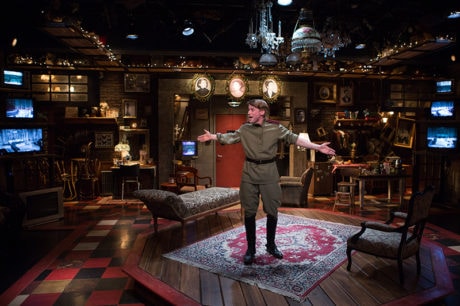
John: Okay, in this fictive faceoff at Studio, we’re agreed Three Sisters doesn’t get the Chekovian humor prize. And I’ll take your word that it’s got appreciable qualities you’ve not seen in previous productions. (I confess this is the first time I’ve seen the play staged). So let’s turn to Aaron Posner’s gambit (which I loved so much I’ve been tempted to see it again).
If I were to rank-order Posner’s recent cheeky refits of Chekhov, I’d have to say Life Sucks is best of the lot, with No Sisters now running a close second. Yup, in my book No Sisters beats out fan favorite Stupid Fucking Bird. (I can hear some readers gasping.) And the reason is again about the play’s insightful faithfulness to the essence of Chekhov. The monologues in No Sisters have been credibly extrapolated from deep inside the characters’ experiences in the play going on downstairs. The referent dramatic context of their lamentations and protestations is never cheated on, never betrayed. Posner pulls no show-off stunts (except, of course, the invention of this faux green room world to begin with). In his own quirky way, he plays it quite straight. And the results are hilarious and touching at once.
How do you evaluate what Posner has done? Did Studio’s commission of the play turn out to be inspired or something less estimable? And given that No Sisters can’t really stand on its own apart from a concurrent production of Three Sisters (with concomitant monitors thereupon), is the production of No Sisters in town right now a one-chance wonder, a novelty slated for the archives of theatrical ephemera? Or is it (as I would argue) a brilliant new way to engage with classic dramatic literature (one that surpasses in lasting value even Stoppard’s Rosencrantz and Guildenstern Are Dead)?
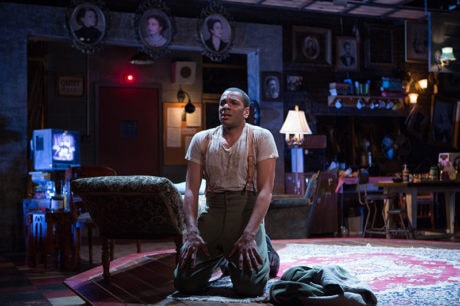
Andrew: Posner definitely has an ear for entertaining dialogue, and his sense of humor (timely sense of humor) is spot-on. It is also significant that he finds ways to deepen the dilemmas faced by some of these supporting characters, Túzenbach and Solyóny especially. Their final argument is dynamite, and the way they stage that final confrontation (no spoilers here) is very attentive to what Chekhov had in mind.
Like you, I enjoyed Life Sucks, which is the only other one of his I’ve seen. I do wonder, however, whether he would have packed No Sisters with as much material as we have here, if the production were stand-alone. I think it could fly higher with a few cuts. And like you, I am not sure whether No Sisters would work without some sense of the original play. He’d have to write a different play, or write it very differently, if he really wanted No Sisters to work outside of a repertory context. At least he has laid out the contours of such a stand-alone piece here.
I’d look forward to seeing this piece in a different context.
As for Three Sisters, you make the good point that it isn’t as entertaining—but perhaps that is a result of Posner’s writing style, and the fact that we’re watching both at the same time. Paul Schmidt is translating a 100-year-old play with 100-year-old characters, while Posner is free to make his characters hip. If you were to watch the current production of Three Sisters minus the simultaneous rep, minus the Posner Effect, I think the reaction might be different.
I definitely recommend people see Three Sisters first, especially if they’re not familiar with it, and then head upstairs. The design for the “downstairs” show is marvelous, and the costume choices there really impressed me. Joy Zinoman’s original Studio production featured officers all in black, which had a rather unpleasant, militaristic overtone. Dressing nearly all of them in olive green, which is the historically accurate color, makes all of the officers more human and that’s actually a very important detail. I would have liked more specificity in the cut of the uniforms, less emphasis on epaulets and badges, but that’s a small quibble.
Perhaps the biggest revelation for me in this production of Three Sisters is Solyóny; he really doesn’t make much of an impression in previous productions I’ve seen, but here Biko’s work is phenomenal. You can tell he’s a powderkeg from the git-go, and hard to take your eyes off of. I left the theatre determined to read me some Lermontov, for the first time ever (he’s a poet that Solyóny quotes frequently). The tension between him and Túzenbach in Three Sisters was more intense here than I’ve seen before, brilliantly done. And I can’t help thinking Posner was sitting in on rehearsals for the other show because upstairs at No Sisters I found his handling of those two characters to be stronger. He’s a funny guy, but he does tragedy really, really well too.
I’m just curious; did you see Posner’s production of Rosencrantz and Guildenstern at the Folger? I ask for a couple reasons, first because that was where I last saw Biko (he was the Hamlet), and second because of Paige Hathaway’s set concept. There seems to be a vogue for storage spaces, attics and such, among designers because Daniel Conway’s “Green Room” brought Hathaway’s set for R&G to mind for me. All the different TVs from different eras, furniture stacked here and there, high shelves, etc, there’s a charm to that kind of bric-brac, very post-modern.
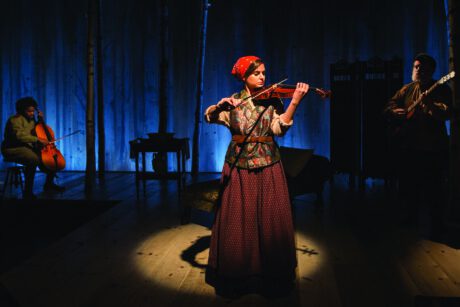
John: I did not see Posner’s R&G. But I’m glad you brought up Daniel Conway’s “weird-ass existential Chekhovian green room” set for No Sisters, which transported me immediately into a sense of backstage intimacy even before any actors entered. I felt I could almost smell the greasepaint and perspiration.
I’m also glad you foregrounded the performances of Biko Eisen-Martin as the brooding, volatile soldier Solyóny and Ro Boddie as his battle buddy, Túzenbach. Their supernumerary roles hadn’t much impressed me in Three Sisters, but Posner’s scripting of those two characters and those two performances completely grabbed me.
On that note I’d add that all the roles in No Sisters, and all the performances, knocked me out in ways that far exceeded my experience of the characters as scripted by Chekhov. In my review I praised Kimberly Gilbert as Natásha and Nancy Robinette as Anfísa in particular. But really the entire cast was one of the most engrossing ensembles I’ve seen—William Vaughn as Fedótik, Ryan Rilette as Andréy, Todd Scofield as Kulygin, Daven Ralston as the sweet Young Woman who shows up in Anfísa’s imagination.
I agree playgoers who plan to see No Sisters should see Three Sisters first. For me the three hours of Three Sisters felt like, well, three hours, whereas for me No Sisters flew by; I could have stayed in Posner’s characters’ company for another act. I’m a sucker for smart writing and strong acting. One without the other is nice; but together: bingo. With No Sisters I hit the jackpot.
Andrew: I think what happens with Chekhov is that he doesn’t want the traditional building tension-crisis-denouement stuff onstage; he wants everything important to happen elsewhere, which creates a huge challenge for the actors because you have to project the inner life of the character in a much bigger way than usual, and show with just your movements and vocal inflections what’s really going on. His reality is inscrutable, and perhaps an acquired taste.
The other thing is that Chekhov, like so many older writers, needs a new translation every generation or so to stay fresh. It could be that it’s time for something a bit more contemporary in order for its energy to match Posner’s.
Then again, having the two together at Studio like this, two opposing approaches to dramaturgy, is delicious fun. You have permission to let it all hang out upstairs, after spending three hours sleuthing around the stage downstairs for signs of conflict. Chekhov’s origins as a short-story portrait artist are perhaps more obvious here, as is Posner’s love of show biz.
Running Time of both shows: Approximately three hours, including one 15-minute intermission.
Three Sisters plays through April 23, 2017, at The Studio Theatre – 1501 14th Street, NW, in Washington, DC. For tickets call the box office at (202) 332-3300, or purchase them online.
No Sisters plays through April 23, 2017, at The Studio Theatre – 1501 14th Street, NW, in Washington, DC. For tickets call the box office at (202) 332-3300, or purchase them online.





Thank you for this enlightening discussion, as well as both of your reviews. I just saw “Three Sisters” last night and look forward to seeing “No Sisters” next week, and I might see “Three Sisters” again at the Kennedy Center next month if I feel up to it, because that will probably be a different take by a Russian troupe.